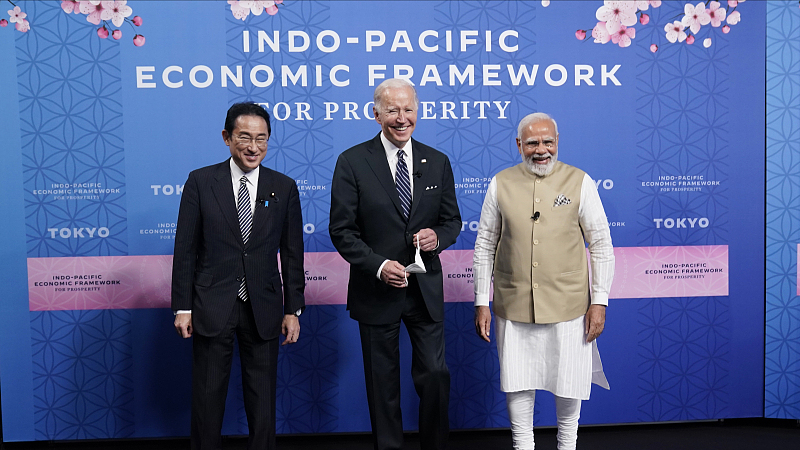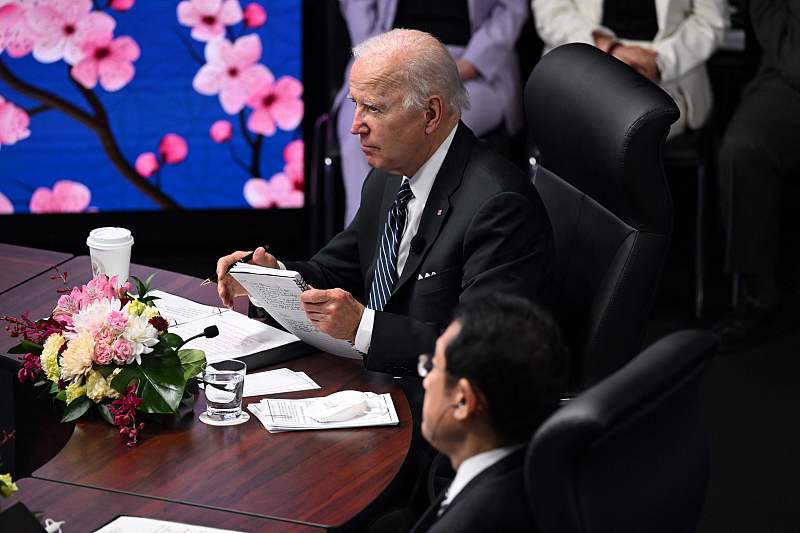
Japanese Prime Minister Fumio Kishida, left, U.S. President Joe Biden and Indian Prime Minister Narendra Modi pose for photos as they arrive at the Indo-Pacific Economic Framework for Prosperity launch event at the Izumi Garden Gallery in Tokyo, May 23, 2022. /CFP
Japanese Prime Minister Fumio Kishida, left, U.S. President Joe Biden and Indian Prime Minister Narendra Modi pose for photos as they arrive at the Indo-Pacific Economic Framework for Prosperity launch event at the Izumi Garden Gallery in Tokyo, May 23, 2022. /CFP
Editor's note: Huang Yongfu is an economic affairs commentator. After earning a PhD, he started his career at the University of Cambridge and then moved on to the UN system. His current interests lie in global development and Sino-U.S. links. The article reflects the author's opinions and not necessarily the views of CGTN.
The Indo-Pacific Economic Framework (IPEF) launched by U.S. President Joe Biden in Tokyo on May 23 is a serious trade initiative with 12 regional economies, aiming to restore U.S. economic leadership in the region, strengthen its economic engagement with regional partners and counter Chinese influence. It contains four pillars inclusive of trade, supply chains, clean energy and infrastructure, and tax and anti-corruption efforts. It may add an important component on digital trade.
IPEF implications on multilateral trading system and global economy
The IPEF draws to an end the neoliberal era with a multilateral trading system based on the classic Ricardian trope in the sense that politics, ideology and cultural values didn't matter so that laissez-faire trade and economic globalization allows trading partners to get richer or better off as long as they could trade together regardless of politics, ideology and values.
Some conventional economic wisdom or hopefully assumptions in 1980s and 1990s will be questioned,such as interdependence among countries,that could lead to cooperation and economic convergence. They would foster political alignment and solidarity.
The IPEF has attacked fatally the very foundations of the rules-based multilateral trading system from several directions at once by friend-shoring of supply chains.
To reduce their reliance on countries of so-called non-market economies, for goods critical to military or other sensitive systems, the West, especially the U.S., have applied trade and industrial policies to revamp global supply chains via reshoring or friend-shoring in terms of confining supply, production and trading chains to its home country or a circle of trusted allies or like-minded partners.
The IPEF in the meantime initiates a new order of global trade trend in the post-neoliberal era with a fragmented trading system made up of divided trading blocs within which like-minded partners share a common set of norms, ideology and cultural values. Trade taking place within each trading blocs but divided trading blocs do not trade much with each other.
Building trading blocs to fragment trading system will be a disaster for the global economy and international relations. It could lower productivity growth for all and hurt both rich and poor nations whose economies have benefited from a more open, global trading system in recent decades.
It could raise the incentive to start unraveling today's close economic relationships and induce intimidation, discrimination and greater contestation for influence among countries and blocs.
Competing trading blocs may ironically increase the likelihood of new trade barriers in the future, impede technology transfer or limit investment needed for research and development and combating climate change.
Therefore, competing trading blocs would be less likely to help achieve non-trade goals such as environmental protection or national security as they are more likely to prioritize short-term goals over long-term goals, making the world more dangerous and unstable.
The U.S. hostility towards geopolitical rivals jeopardizes the multilateral trading system
The faltering American commitment to free trade and multilateral trading system is partly due to the WTO losing both efficacy and legitimacy, and partly to its economic nationalism, populism and hostility towards geopolitical rivals.
It is unfortunate that the U.S. has abandoned the rules-based multilateral trading system that it helped create since the 1940s, which has been so crucial to global growth, peace and stability in recent decades.

U.S. President Joe Biden and Japan's Prime Minister Fumio Kishida attend the Indo-Pacific Economic Framework for Prosperity with other regional leaders via video link at the Izumi Garden Gallery in Tokyo, May 23, 2022. /CFP
U.S. President Joe Biden and Japan's Prime Minister Fumio Kishida attend the Indo-Pacific Economic Framework for Prosperity with other regional leaders via video link at the Izumi Garden Gallery in Tokyo, May 23, 2022. /CFP
To justify their misguided policies to contain China, the U.S. political elites relentlessly use a nasty blame game without sufficient evidence. Dressed up in liberal and free casuistry, their anti-China policies are replete with continued deception, deflection, politicization of trade and demonstrate chicanery and political extremism to a new high of cynical self-aggrandizement. Below is just a case in point.
The U.S. annual trade policy agenda released in March contains baseless claims that "China's doubling down on its harmful trade and economic abuses," "Lack of protections for workers, a weak environmental regime, and anti-competitive subsidies are the hallmarks of China's artificial comparative advantage."
How can nations adapt to the new reality in a post-neoliberal era?
First, the Indo-Pacific countries included in IPEF should be girded for being exploited and targeted.
On the one hand, as a nontraditional free trade agreement, the IPEF will not provide member countries with access to the U.S. market, but act as a platform for the U.S. to cultivate regional economies for cheap labor and raw materials and force them to cater to its interests. This is pointed out in my previous op-ed entitled "The U.S. kicks off neocolonialism via Indo-Pacific Economic Framework."
On the other hand, the U.S. is now targeting China, but the next one could be Japan, India, Vietnam or others. This is simply because the U.S. always pursues a selfish policy that places its interest ahead of the interests of its partners such as Trump's "America First," and will no doubt attack any country threatening it.
Second, countries outside the IPEF should be adapted to the new reality in creative and growth-enhancing ways.
Given that IPEF is an essentially closed and exclusive trading bloc with clear geopolitical and ideological intentions, countries outside the IPEF should come up with a new non-export driven development strategy, together with more resilient trade pathways.
Third, the WTO needs deep reform, rather than being divested.
The merit of the WTO is to create predictable rules and a framework for managing disputes and spillovers and conducting global cooperation to protect against everything from illicit capital flows, climate change, to recurring pandemics. The scope of existing trade agreements should be expanded to fix inefficiencies and other issues related to competition, environment, labor, and gender.
(If you want to contribute and have specific expertise, please contact us at opinions@cgtn.com. Follow @thouse_opinions on Twitter to discover the latest commentaries in the CGTN Opinion Section.)

